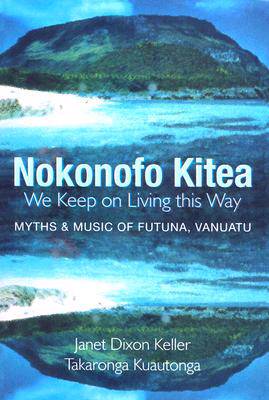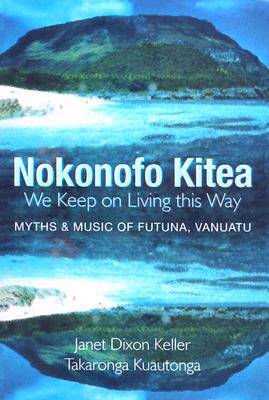
- Retrait gratuit dans votre magasin Club
- 7.000.000 titres dans notre catalogue
- Payer en toute sécurité
- Toujours un magasin près de chez vous
- Retrait gratuit dans votre magasin Club
- 7.000.0000 titres dans notre catalogue
- Payer en toute sécurité
- Toujours un magasin près de chez vous
Nokonofo Kitea (We Keep on Living This Way)
Myths and Music of Futuna, Vanuatu
Janet Dixon Keller, Takaronga Kuautonga
Livre relié | Anglais
76,45 €
+ 152 points
Description
Nokonofo Kitea, centered on stories and songs from the Polynesian outlier West Futuna, Vanuatu, aims to accomplish three goals: found a secular literature, celebrate and interpret the verbal arts, and connect ancestral discourses with the complex fabric of present-day lives.
In the narratives islanders past and present enunciate personal and social struggles, articulate power dynamics, and proclaim the cultural geography and cosmology that promote community. History emerges through their perspectives. Gender, marriage, residence, exchange, and alliance are interrogated; gluttony and conservation juxtaposed. The disquiet associated with early evangelism is coded in metaphor. Homeland is ambiguously valued as secure yet confining while the horizon attracts yet endangers those who would travel. Offering a resource for renewed debate, the volume envisions a place for oral heritage in transforming present and future conditions associated with migration, urban development, nationalism, and globalization. Every facet of the work is collaboratively shaped. Texts were selected and translations emerged in extended dialogues addressing literacy, audience diversity, and relevance. Narrative interpretations remain dialogic throughout the book, reflecting varying perspectives: melded, intermingled, or in conflict. Theoretical vantage points combine indigenous and Western positions. Local wisdom highlights the relations between surface utterances and underlying messages and emphasizes the potency of metaphor, enabling people to speak their minds while shielding their intentions. These ideas are linked in Western intellectual traditions to pursue relations between the said and the unsaid, center texts within imaginal and real contexts, and unravel figurative tropes.Spécifications
Parties prenantes
- Auteur(s) :
- Editeur:
Contenu
- Nombre de pages :
- 324
- Langue:
- Anglais
Caractéristiques
- EAN:
- 9780824831134
- Date de parution :
- 01-03-08
- Format:
- Livre relié
- Format numérique:
- Genaaid
- Dimensions :
- 148 mm x 211 mm
- Poids :
- 539 g

Les avis
Nous publions uniquement les avis qui respectent les conditions requises. Consultez nos conditions pour les avis.






